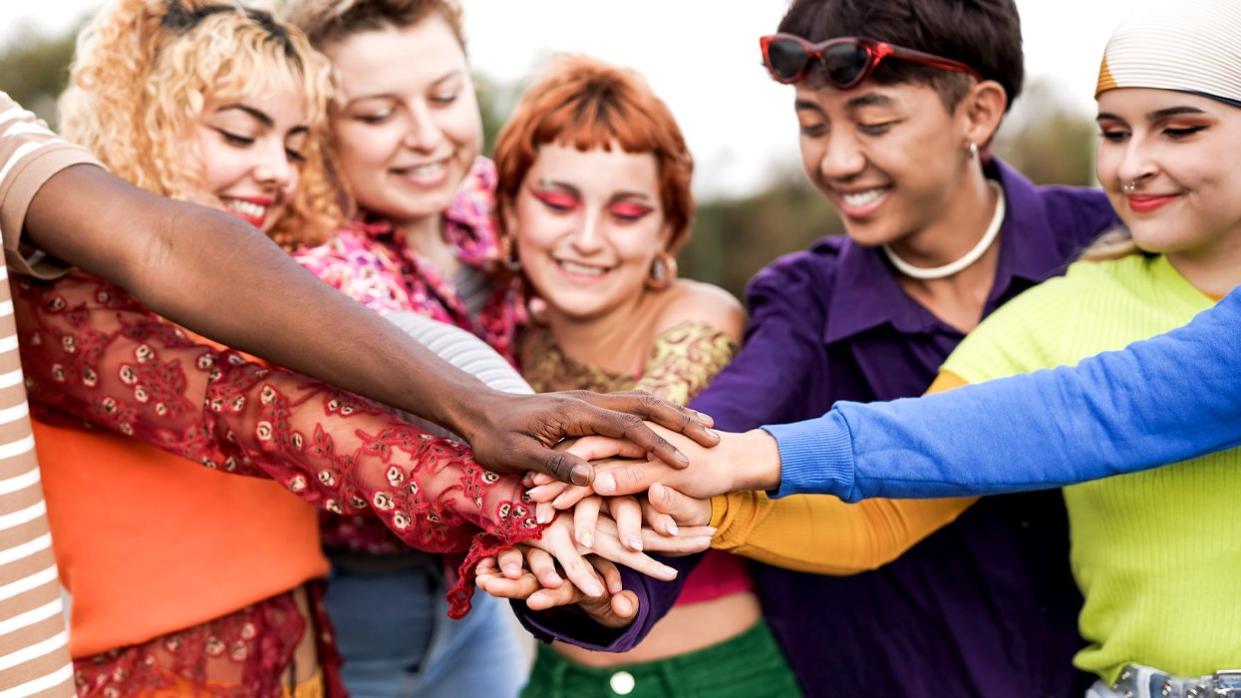LGBTQ+ youth are facing a mental health crisis. Here are simple ways you can help.

According to the Trevor Project's 2024 Survey on LGBTQ+ Youth Mental Health, 39% of LGBTQ+ young people seriously considered attempting suicide in the past year, including 46% of transgender and nonbinary young people. In addition, nearly half of LGBTQ+ young people ages 13-17 experienced bullying in the past year. The 2024 survey also reported that 90% of LGBTQ+ young people said the recent "culture war" over queer rights has negatively impacted their well-being.
The onslaught of anti-LGBTQ+ legislation targeting young people's access to healthcare, dignity in school, and inclusion on sports teams has exacerbated already high rates of anxiety, depression, and suicidal ideation. We are living in a pressure cooker moment that is having devastating effects on LGBTQ+ youth's mental health.
But queer and trans youth do not need to face this moment or these challenges alone.
As an LGBTQ+ youth service provider, my team works daily to support young people through mental health counseling, social support, housing, youth leadership, and community education. In our 40 years of service, we have seen how affirming support for queer and trans youth is life-saving.
Studies have shown the presence of at least one LGBTQ-affirming adult in a young person's life can reduce the risk of a suicide attempt by nearly 40%. Through our work with parents and caregivers, we equip adults to be that person.
If you're looking for a place to start supporting the LGBTQ+ youth in your life, we'd like to share some tips with you:
Create a safe and supportive environment where your child feels accepted and loved for who they are.
Listen actively by encouraging open conversations, listening without judgment, and validating their feelings and experiences.
Educate yourself about LGBTQ+ identities, experiences, and issues to better understand and support your child.
Respect their identity by using their preferred name and pronouns, respecting their journey, and avoiding pressure to conform to societal norms.
Advocate for them by standing up against discrimination and bullying and advocating for inclusive policies in schools and communities.
Encourage self-care by helping them develop healthy coping mechanisms and practices. Encourage activities that promote mental and emotional well-being.
Celebrate achievements and milestones by recognizing their success, both big and small.
Support their positive friendships and relationships by helping them build connections with affirming peers and mentors.
Lead by example by showing acceptance and respect toward all individuals, regardless of their sexual orientation or gender identity.
Respect their need for privacy and allow them to share their identity at their own pace. By implementing these tips, parents, and caregivers can significantly contribute to the mental well-being and happiness of LGBTQ+ youth.
Be proactive about mental health by keeping an eye out for signs of distress or mental health issues. Encourage professional help when needed.
Seek support by connecting with LGBTQ+ support groups, therapists, or counselors who are affirming and experienced in working with LGBTQ+ youth.
Just as youth do not need to go at this alone, neither do you.
Affirming mental health counselors can help you and your child by addressing the unique challenges LGBTQ+ youth often face, such as navigating and understanding their identity, coming out, discrimination, and family acceptance. Counselors trained in LGBTQ+ issues acknowledge and validate the experiences and identities of queer and trans youth, which can significantly improve self-esteem and mental well-being.
By seeking an affirming therapist for your child, you invest not only in their mental health and overall well-being. These therapists can also be a significant resource for you, helping to provide education, understanding, and guidance.
Despite youth's overwhelming desire to seek mental health care, there are still barriers to access. From financial burdens and stigma to a lack of affirming therapists, fears of being misunderstood, or being unable to find a therapist who speaks their language.
In addition to integrating respect and affirmation at home to support LGBTQ+ youth, we must do more as a community to ensure that the young people who are looking for support can access it. Our community members must invest in the next generation by ensuring they have accessible, affirming, and empowering mental health support. Only then can LGBTQ+ youth can thrive.
This Mental Health Awareness Month, let's all commit to being partners to better support youths' mental health by creating welcoming environments at home, working with affirming therapists, and reducing barriers to access.
Brittni Dash is the Director of Clinical Services at SMYAL where she oversees the organization's mental health counseling program for LGBTQ+ youth. Brittni brings her over 15 years of experience to her work specializing in providing therapy to individuals, groups, families, and couples who may be struggling with depression, anxiety, grief & loss, mental health, trauma/abuse, sexuality, and life transitions, as well as clinical supervision.
Equalpride, the parent company of The Advocate, is proud to partner with SMYAL as part of our Community Partnership program. You can learn more about our initiative at equalpride.com/partnership.
Voices is dedicated to featuring a wide range of inspiring personal stories and impactful opinions from the LGBTQ+ and Allied community. Visit Advocate.com/submit to learn more about submission guidelines. We welcome your thoughts and feedback on any of our stories. Email us at voices@equalpride.com. Views expressed in Voices stories are those of the guest writers, columnists and editors, and do not directly represent the views of The Advocate or our parent company, equalpride.

